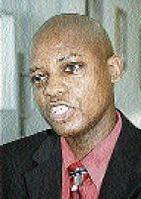Avia Collinder, Outlook Writer
Glenford Smith, also an electrical engineer, says that his mission in life is to help individuals find the 'energy' within and become the best that they can be.- Ian Allen/Staff Photographer
Author, peak performance coach and motivational speaker Glenford Smith will, in October, facilitate those who want to make significant changes in their lives and gain wealth through his seminar series 'Overcoming Inertia: Success through Action, Responsibility and Resilience (STARR)'. This week in Outlook, he answers questions about the seminar and his first book, which was recently launched in audio version:
O: What is inertia, and why does this present a problem in personal development?
Inertia is a physical law which states that an object at rest will tend to remain at rest unless some force acts on it to make it change its course (Isaac Newton). You can have all the opportunities and privileges in the world, (but) if you procrastinate, yield to inertia, or if you are afraid, have low self-esteem - all of these things will inhibit you and stop you from doing the things you need to do. Neither education nor money makes a difference. Without motivation there is no achievement. Motivation is what impels you. But a lot of people are at rest. They are not going any where.
Is peak performance coaching similar to guidance and counselling?
It is not guidance and counselling which focuses on how to cope with problems. Peak Performance Coaching (PPC) is an applied behavioural method. It is about identifying the best inside of you and bringing that out to the world, creating a life that you feel happy about. Compared to what we know, we achieve very little. PPC is about applying the science of motivation and psychology to accomplish specific goals and bring out the best that people have inside themselves.
You are a trained electrical engineer and a graduate of the University of Technology. In your last year with the Jamaica Public Service company you won a merit award for outstanding performance. What motivated your decision to leave this job after 13 years for the motivational circuit?
It was not really a switch. I always knew that this is what I wanted to do - I understood that my life was to be about helping people to find out who they are and to become the best that they can be. I had a strong sense of mission. I saw my work with JPS as a training ground. The company's motto was 'Changing life with energy.' I am now helping people to change their lives by discovering their own power as a source of energy.
What's the connection between engineering science and what you have now chosen to do?
The scientific background was excellent. I have been studying success for years and all the best minds agree that success is a science. It is the result of studying certain laws and principles. Engineering is the application of scientific laws and principles to solve certain problems. Motivational science is about applying psychological and physical principles to solve problems and create results in peoples lives by enabling them.
It' s about knowing how to skillfully apply principles. My function at JPS was that of a design engineer. A designer crest a vision of what he wants and the principles required to achieve the outcome. Success engineering is the same thing; you are creating life results in the major areas of education, affluence or wealth, relationships, career and happiness.
Why do you believe that this kind of 'success training' is needed in Jamaica at this time?
Many individuals are unaware of the need. People feel that success is a result of God's blessing, 'buck up', or that some people are just luckier than others, or had better parents.

